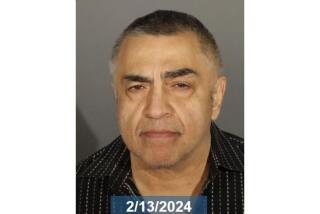Encino Firm Accused of Mishandling McEnroe Escrow : Real estate: The company vehemently denies any wrongdoing. It challenged regulators by taking the case to Superior Court.
- Share via
California regulators are accusing another Encino escrow firm, Pavilion Escrow Inc., of breaking state laws while handling several real estate deals, including the $3.6-million sale of tennis star John McEnroe’s house in the exclusive Carbon Beach area of Malibu.
In a complaint before the Department of Corporations (DOC), Corporations Commissioner Christine W. Bender has alleged that Pavilion, among other things, opened two different escrows on McEnroe’s house early this year without telling McEnroe or getting his approval--in violation of state financial laws. McEnroe eventually sold the house in May.
But Pavilion vehemently denies any wrongdoing, and aggressively challenged the DOC by taking the case to Superior Court in Los Angeles.
In the McEnroe case, Pavilion asserts that the two escrows were merely a paperwork oversight. Both escrows involved the same buyer and seller, and it was “physically impossible” for McEnroe to not have approved the situation because he signed the instructions for both escrows, Joseph S. Fischbach, a lawyer for Pavilion, said last week.
Moreover, neither McEnroe--who had bought the house from Johnny Carson--nor anyone else has filed a complaint about Pavilion with the DOC or brought a lawsuit in court, Fischbach said.
Jerome J. Eisenberg, a former lawyer for Pavilion, said in court papers that “all the parties were advised of the nature of the transaction and simply forgot to cancel” the first escrow.
“The allegations stated by the DOC are frivolous and clearly demonstrate their inability to understand complex transactions,” Eisenberg stated.
Escrow firms, which must be licensed by the state, help ensure that buyers and sellers of real estate meet certain conditions, such as obtaining a title search, before the sale is completed. In effect, they stand as a neutral party, holding documents and cash transferred between the buyer and seller until the deal is closed. Frequently, each side is required to make a deposit of at least a few thousand dollars to open escrow.
The Pavilion case points up how the DOC is looking closely at escrow firms since early last year, when the agency seized the now-defunct Escrow Shoppe, another Encino firm. The DOC closed it after alleging that the Escrow Shoppe made unauthorized payments totaling $3 million, and asserting that up to $450,000 was missing.
In that case, the DOC was heavily criticized by some of the Escrow Shoppe’s customers because the DOC also froze $5 million of customers’ money for several months while its investigation continued, which threw the customers’ housing plans into chaos.
In the Pavilion case, however, none of the complaints by Bender involve missing funds or customers being deprived of cash they were due.
She did allege that Pavilion altered escrow instructions, failed to disclose important information to lenders and let its former lawyer, Eisenberg, draw cash from Pavilion’s bank account without first telling regulators. In court papers, Pavilion called all the allegations false and, on the Eisenberg matter, said he only had access to the firm’s “general” bank account, not the “trust” account where customers’ escrow funds are held.
The DOC’s complaints were made on June 20 and co-signed by Judy L. Hartley, a senior counsel at the DOC in Los Angeles who declined comment on the case. The agency also said then that it planned to revoke Pavilion’s escrow license and to bar its sole owner, Deidre Nulty, from the business pending a hearing.
In the meantime, the DOC tried to block Pavilion from accepting any new business because “we thought the danger to the public was so great,” said Alan S. Weinger, a DOC lawyer.
But Pavilion convinced a Superior Court judge in Los Angeles to block the DOC’s order stopping Pavilion from taking on new accounts, because Pavilion had not been given due process to defend itself. Pavilion today continues operating as normal under Nulty’s supervision.
Pavilion also tried to get a court order blocking the DOC from pursuing its intention to shut Pavilion down, but Pavilion lost that round. So the parties are scheduled to argue the matter before an administrative law judge Nov. 6.
According to court records, Nulty started Pavilion in February, 1989, and has been in the escrow business overall for nine years. She deferred comment on the DOC case to her lawyer.
More to Read
Inside the business of entertainment
The Wide Shot brings you news, analysis and insights on everything from streaming wars to production — and what it all means for the future.
You may occasionally receive promotional content from the Los Angeles Times.











